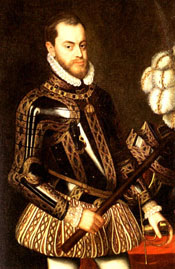First Performance: 11 March 1867 at the Opéra, Paris.
Revised version 10 January 1884 at Teatro alla Scala, Milan.
| Principal Characters: | |
| |
| Philip II, King of Spain | Bass |
| Rodrigue/Rodrigo, Marquis of Pisa | Baritone |
| Don Carlos/Don Carlo, Infante of Spain | Tenor |
| The Grand Inquisitor | Bass |
| Elisabeth de Valois, Philip's queen | Soprano |
| Princess Eboli, Elisabeth's lady-in-waiting | Mezzo-Soprano |
| Thibault, Eisabeth's page | Soprano |
| The Countess of Aremberg | Silent role |
| The Count of Lerma | Tenor |
| An Old Monk | Bass |
| A Voice from Heaven | Soprano |
| A Royal Herald | Tenor |
| Flemish Deputies | Basses |
| Inquisitors | Basses |
Setting: France and Spain, about 1560
Synopsis:
Act I.
In France and Spain in 1568. The Infante of Spain, Don Carlos, meets Elisabetta di Valois in Fontainebleau, and immediately falls in love. The young woman returns his sentiment, but the news that the king of France has conceded the hand of Elisabeth to Carlo's father, the king of Spain Filippo II, strangles the love of the young couple.
Act II.
In the cloister of the San Giusto convent, the monks are praying at the tomb of Carlo V. Here Don Carlo confides his sorrow to his friend Rodrigo, who advises him to leave Spain for Flanders where a gesture of pacification on his part is urgent. Carlo entrusts a last message for Elisabetta, by now bride of the king of Spain, to Rodrigo: he wants to see her once more before leaving the country. During their furtive meeting he tries to win her back, but, though perturbed, she remains faithful to her vows. As soon as Carlo goes out, king Filippo comes in; finding the queen alone, without her usual lady companion, he blames the countess of Aremberg, sending her back to France. Then, alone with Rodrigo, he makes fleeting mention of his jealousy of a possible love between Elisabetta and his son.
Act III.
In the queen's gardens in Madrid, during a feast. Don Carlo has a meeting with a lady who presents herself heavily veiled. He thinks it is Elisabetta and confirms his love for her, but instead, it is the princess of Eboli, in love with him, but when she realises what his real sentiments are, decides to get her revenge. Rodrigo tries in vain to calm her. On the square of Madonna d'Atocha, a group of heretics are sent to the stake.
Several Flemish deputies, led by Don Carlo, interrupt the royal procession to ask the king to end the persecution taking place in Flanders. The king defines them as rebels and Don Carlo draws his sword against his father, but Rodrigo stops him. For this act, Filippo names Rodrigo duke.
Act IV.
In his study, Filippo meditates on the difficulties of the life of a monarch, when the Grand Inquisitor arrives. He asks that both Carlo and Rodrigo be condemned as heretics: the latter especially, he fears headed for open rebellion. Elisabetta comes in distraught: her jewel-case is missing. The case is on Filippo's desk, taken by the princess of Eboli from its owner, as her revenge against the queen: in it is a portrait of the Infante, and now the king is certain of his wife's betrayal. In vain the queen denies an adulterous relationship with Carlo. Princess Eboli, repentant, arrives to confess her guilt and decides to retire to a convent. Meanwhile, in the prison where Don Carlo is held prisoner, Rodrigo tells him he will not be condemned: to save him he has accused himself, using the document the Infante had entrusted him previously. Carlo does not believe him, but a shot rings out from an arquebus hidden behind them: Rodrigo is hit in the back and dies. The king arrives to free his son and the people celebrate Don Carlo.
Act V.
Elisabetta is in the cloister of the San Giusto convent. She prays on the tomb of Carlo V, asking protection for Don Carlo. He arrives, to give his final adieus: he is on his way to Flanders, to install there the ideals of liberty. But Filippo II and the Grand Inquisitor arrive, believing the two to be lovers.
Carlo is about to be arrested, but Carlo V's tomb opens and the soul of the Great Emperor takes possession of his descendent, saving him, and taking him away.
[Synopsis Source: Giuseppe Verdi il sito ufficiale]
Click here for the complete libretto.
Click here for the complete libretto (German translation).
Click here for the text of Don Carlos, Infant von Spanien.
Click here for the text of Don Carlos, Infant von Spanien (English translation).
